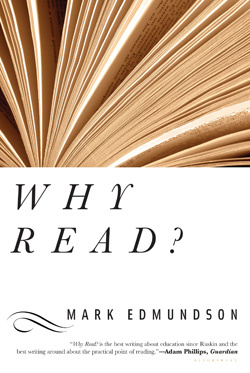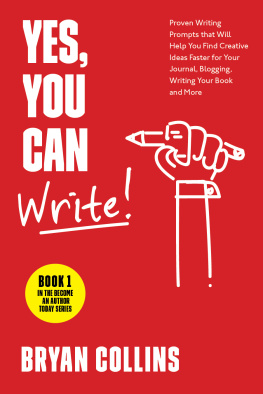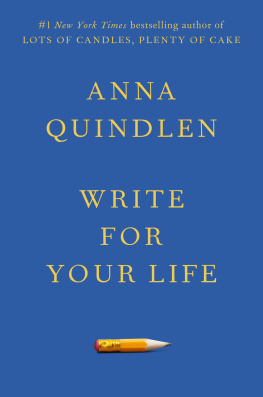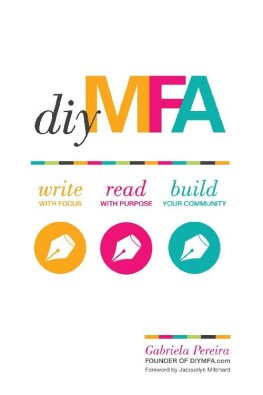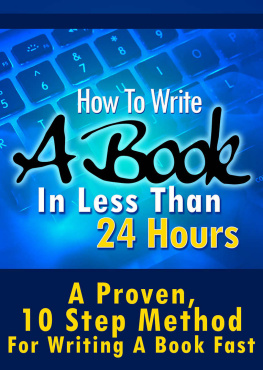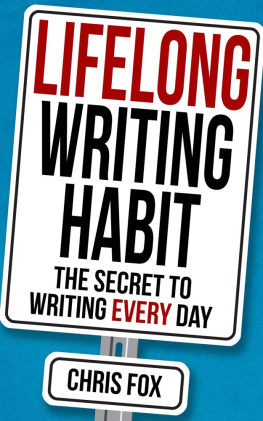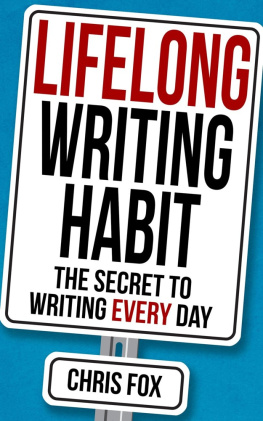WHY WRITE?
To James Naismith and His Game
BY THE SAME AUTHOR
Self and Soul: A Defense of Ideals
Why Football Matters: My Education in the Game
Why Teach? In Defense of a Real Education
The Fine Wisdom and Perfect Teachings of the Kings of Rock and Roll: A Memoir
The Death of Sigmund Freud: The Legacy of His Last Days
Why Read?
Teacher: The One Who Made the Difference
Nightmare on Main Street: Angels, Sado-Masochism and the Culture of Gothic
Literature against Philosophy: Plato to Derrida
Wild Orchids and Trotsky: Messages from American Universities (ed.)
Towards Reading Freud:Self-Creation in Milton, Wordsworth, Emerson, and Sigmund Freud

Contents
Why write?
Why write when so many forces in the world seem pitched against writing?
Why write when it sometimes feels that so few people really read? I mean read slowly, tasting the words: read deliberately, as if their lives might be changed by what theyre reading.
Too often now the public reads for information, not enlightenment. People read to be brought up to date and put in the know. They want telegraphic bursts of prose. They want the words to be transparent, not artful or arresting. They need to get right to the truth, or failing that, directly to the facts. It can seem now that writing is a service: the writer dishes up information the way the counterman dishes lunch at the fast-food restaurant. In his worst moments, the writer feels that the world doesnt really want writing: if by writing you mean thoughtful, nuanced interpretations of experience that could actually shift some basic perceptionsmaybe even change some lives.
And if that is the case, why write? Why try, with as much selflessness as you can, to enlarge the contours of your mindand to give others what real writing always has: pleasure and instruction, beauty and truth?
The world wants to be informed not enlightened, and the world wants to be entertained not inspired. Fiction writers now are supposed to give the readers exactly what they want. Novelists are to provide well-crafted, modest explorations of modest but badly crafted lives. Poets are to speak of themselves and themselves only (no big reachno justifying Gods ways to man, or mans to God) and speak in a timid whisper of a voice. To be a poet in America now is a slightly shameful condition, like having a mild drug habit or talking occasional smack to other peoples kids.
In America what once were artists are supposed to be entertainers. They shouldnt offer tough or potentially dispiriting work to the world: they need to shake their rattles and jangle their bells. They live in a culture that measures success by the number of copies sold not the number of spirits touched. They have to shorten their sentences and compress their sentiments to the common bandwidth. They ought to stop worshipping low-sale losers like Virginia Woolf (a suicide) or Herman Melville (died in despair) and begin to model their careers (writers now have careers) on palatable entertainers.
Get this straight, too. In America what once were essayists and critics are now consumer guides. They write not to tell us what art they favor. That would be elitist and narcissistic to boot. They write to let us know what we would like. They are in position to reflect taste (our taste) and not to shape it. They must use small neat words; they must pretend to like what the mass of their readers do; they must never make anyone feel dumb.
The artist is a glorified entertainer; the critic pens consumer reports. Under these conditions: Why write?
Why write when every day words seem to mean less and less? We are, its said, becoming a culture of images. Developments in video technology have created wonders. A flat-screen TV delivers a vision that can seem more real than reality. The soft green landscape out my window cant compete in intensity with the high-def football game playing on the TV just below it. On the screen, life seems to be on fire. Every figure and every object appears to exude internally generated light. At the movies, we see that directors can put any image they wish on the screen. Dream it and your dream comes true. Would you destroy the Earth? Say the word to the special effects team, seated like obedient gnomes at their computers. Will you restore it all before the end of two hours? Done.
How can writing compete? How can shadowy etchings on the surface of soon-to-yellow paper or bug-like squiggles on a screen touch the glittering image? The TV producer has become a demiurge. The film director is Jove. How can the inch-ling scraping along with his stylus ever compete? Its an open question now whether any traditional art can have the impact of the most modestly produced and conceived video diversion.
And if that is so: Why write?
There is another simpler and perhaps more serious objection to be made to writing. There is already too much of it. We live in a torrent of words that are already written and words fast coming into being. The Internet has made everyone a furious scribe; that much is understood. But beyond the Babel of words that flows daily into the world there is the accumulation of the most distinguished wordsthe best that has been known and thought. Libraries overflow with them and the Internet, for all its excesses, has brought us within a few strokes of Paradise Lost and Regained.
Why write when Shakespeare has already written? What has already been composed and is now there in the public domain is daunting in its magnificence and plenitude. An entire lifetime isnt enough to read all of the literature in English, or English translation that is worth reading. More lifetimes would be needed to take in the best of the sciences, law, social thought, and political reflection. Why try to add ones bit to this amazing horde of words, a treasure we can now see and enjoy online, with less exertion than it took the Arab merchant to whisper open sesame?
And why write when it is so damned hard to do? There really is no writing, one is told time and again. There is only rewriting, and in this there is some truth. The ones who have come before have set the bar high and every writer knows that no matter how lucky a day it has been, how smoothly the first draft rolled out, there will still be dozens of revisions and re-revisions. Writers often look at what they have done and say simply: It doesnt work. When a mechanic says as much about the engine, he usually knows whats wrong and what needs to be done, or he can narrow it down to three or four possibilities. But the writer often has no comparable clue. Its broken; she knows that. But whats the fix?
Walt Whitman implicitly compared writing to the work of a noiseless, patient spider. The spider is constantly sending strands of filament into the void to create his web. Sometimes the strands catch and hold, but mostly they dont. The spider, undaunted, keeps letting the filaments flow. Whitmans suggestion is clear enough: the writers efforts come from deep inside, out of his guts. When he fails, it is not language that is failing or the genre or the culture: he is the one who is failing and it is (dare one say it?) very much like a spiritual failure. Yeats says it as well as anyone ever could:
A line will take us hours maybe;
Yet if it does not seem a moments thought,
Our stitching and unstitching has been naught.
Better go down upon your marrow-bones
And scrub a kitchen pavement, or break stones
Like an old pauper, in all kinds of weather;

